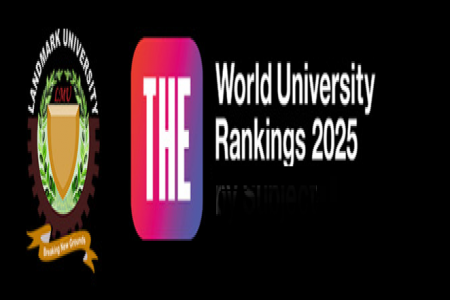
Story of the week
The 18th edition of the Landmark University Centre for Research, Innovations and Discoveries (LUCRID) webinar series, which was held on Wednesday 23rd February 2022, harped on global food insecurity and wastage as a challenge that must be tackled through sustainable food and agriculture systems.
The Acting Vice-Chancellor, Professor Charity Aremu, in her opening remarks, noted that the United Nations’ Sustainable Development Goals 2 (SDG2) ‘zero hunger’ would only be realized if food wastage is eradicated, and food availability, accessibility and affordability are ensured through sustainable food and agricultural systems. Professor Aremu identified rising food demand as a result of a growing population, hunger and malnutrition, the negative effect of climate change, and excessive use of natural resources among others as threats to sustainable food production. She, thereafter, urged participants to co-stream, that is getting involved, in proffering solutions to the global food challenges.
Earlier in her welcome address, the Registrar of Landmark University, Miss Adefunke Fola Oyinloye had expressed the University’s unremitting alignment with its tripartite responsibility of teaching, research and community development as shown in her exploration of the Sustainable Development Goals to achieve her set vision through innovative research activities which LUCRID is driving.
Giving the prologue of the webinar, the Director LUCRID, Dr Adeolu Adediran stated that sustainable food and agriculture contribute to food security, availability and access. He expressed optimism that the presentations would further situate the quest of Landmark University on food production and sustainability.
The first presenter, Dr Iyiola Owolabi of the Thammat University of Technology, Thailand spoke on the theme of the webinar, “Sustainable Food and Agricultural Systems: The Role of Co-Streams Utilization”. She revealed that the world still faces food deficiency in spite of the global food production of 23.7 million tonnes which is expected to be sufficient. She identified the increase in population, food wastage, poverty, land scarcity and climate change as some of the main encumbrances to food production. According to Dr Iyiola, by 2050, agriculture is expected to increase food production by 60% to feed the world. To meet up this expectation, she stated that sustainable food and agricultural systems through scaling up agro-ecological approaches, avoiding food loss and food waste, improving the food system, particularly by diversification are key. She, therefore, concluded that tackling zero hunger is not only about feeding humans but also nutrition and human health.
The second presenter, Dr Olatunde Oladipupo who premised his presentation on Co-stream utilization took participants through the different types of co-streams and practical ways of utilizing them. Dr Oladipupo in his presentation identified diverse food waste that could be harnessed into medicines, nutrition improvement, supplements, cosmetics, biofuel, poultry and animal feeds, and preservatives among others. He highlighted the utilization of animal blood as a good source of protein, hides and skin for hydrolygen and collagen, bones for bio calcium, and eggshells as an excellent source of plant nutrients among other things which are perceived wastes that could be utilized. He also mentioned co-streams on cereals, citric fruits, leaves and husks as other plants that could also be used to secure food nutrition and healthy living. Others are fishes and seafood which include fish scales, skins, fish eyes and fish frames.

The acting Vice-Chancellor, Professor Charity Aremu giving her opening remark

The Registrar, Miss Adefunke Fola Oyinloye giving her welcome remark at the webinar

The Acting Dean, College of Agricultural Sciences, Dr O. Alabi at the 18th LUCRID webinar

DLUCRID, Dr A. Adediran at the webinar

Dr Iyiola Owolabi while making her presentation at the 18th LUCRID webinar

The second presenter, Dr Olatunde Oladipupo answering questions after his presentation

(R-L) DCBS, Dr. Ben-Caleb Egbeide, Professor Olasunkanmi Bamiro and HOD Agriculture Sciences Dr. Aruna Adekiya

A cross-section of students at the webinar series
Get the latest news and updates by signing up to our daily newsletter.

Story of the week